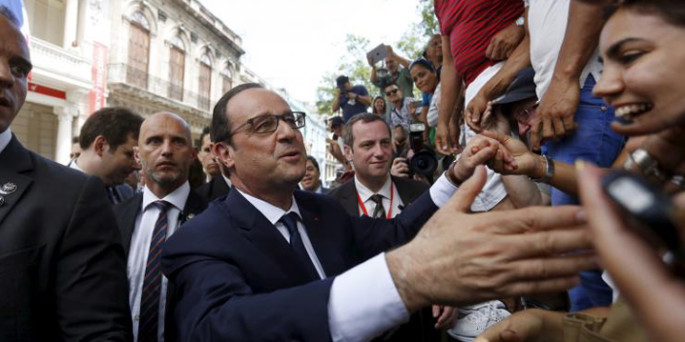
France’s ’17D’ in Cuba
The abbreviation 17D is commonly used to represent “17 December” 2014, the day when presidents Raúl Castro and Barack Obama surprised the world by announcing a transcendental change in relations between their two countries.
In another sense, the recent visit to Cuba by French President François Hollande could be considered a similar surprise.
In the first place, because it was the first visit to Cuba of a president of France — perhaps of Western Europe — in all of French history. But, beyond that, because Hollande said things that I don’t think anyone expected him to say.
“Cuba is an expression of dignity and independence,” said Hollande to the Cubans, a statement meant to be heard throughout the world, especially in the United States, the country to which the words were really directed.
As if that weren’t enough, he added: “We are ready to accompany you, but respecting your identity, your model, your independence. To us, those are essential principles.”
It seems to me that Hollande was also talking about France’s own independence, because if the U.S. blockade against Cuba has meant anything to Europe, it has been a flagrant violation of the sovereign rights of its nations.
The immediate reaction of the European states to the proclamation of the Helms-Burton Law in 1996 was a rejection of its extraterritorial attributions.
Several countries announced the adoption of “antidote laws” to prevent the law’s application within their boundaries; they threatened to seek accords against it in the World Trade Organization (WTO) and joined its universal condemnation in the United Nations General Assembly.
But in the long run they gave in to U.S. pressure. The formula for conciliation that they adopted was the so-called “Common Position of the European Union Toward Cuba,” through which the U.S. agreed not to apply the law against European companies if their governments joined the criticism against Cuba and excluded the island from any cooperation accord with the bloc, so long as Cuba didn’t carry out the “reforms” they demanded.
But that compromise was not respected by the U.S. and, with the excuse of violating the ban on the use of the dollar in financial transactions with Cuba, Washington sanctioned several European companies with multimillion-dollar fines. The most emblematic case was the 8 billion 900 million-dollar fine imposed against the French bank BNP-Paribas barely one year ago, the highest fine ever imposed against any foreign company.
U.S. logic, contained in the Helms-Burton Law and other punitive measures against Cuba, was very clear: “Cuba belongs to us and if we cannot — or, rather, don’t want to — invest in that country, no one else can do so.”
It was practically a carbon copy, in the post-Cold War era, of the hegemonic unilateral principles established by the United States against the island in its Monroe Doctrine of 1823 and the Platt Amendment in 1902, when Washington conditioned its acceptance of Cuba’s independence to Cuba’s subordination to Washington.
A news item from Agence France-Presse, reporting on Hollande’s visit, said that “Concern and irritation” pervade the European Union regarding the economic blockade against Cuba.
Not surprising, especially now that the U.S. government, evidently without consulting with its European allies, shifts away from its previous policy and leaves them hanging in embarrassment with the “Common Position” invented by José María Aznar in an alliance with the Cuban-American far right.
As Hollande hinted and Raúl Castro practically affirmed, the Common Position is on its last legs. It is almost certain that an “Accord on a Political Dialogue and Cooperation with the European Union” will be signed in June, opening the door to Cuba’s relations with the bloc.
That accord will facilitate even further Cuba’s bilateral relations with the E.U. countries, relations that not even the Common Position could prevent altogether.
There will also be an increase in the interest and boldness of European businesses to access the Cuban market. In the case of France, this was translated into the signing of a series of important accords, although the two nations will have to do business under the tensions imposed by the blockade and the conflicts the blockade might generate with the U.S. government, which is still tangled in its own ropes.
We are witnessing another evidence of the failure of U.S. policy against Cuba and the contradictions that it has generated and can still generate on an international scale.
We are also witnessing a new moment that reflects the relative decay of a hegemony that no longer can impose such policies without a significant cost to a world order that still caters to U.S. interests.
The good news to the Obama administration is that Europe’s reaction incorporates new elements to justify the changes adopted in its policy toward Cuba and encourages the forces in the U.S. that advocate an immediate end to the economic blockade, aware that every passing day places them in a more disadvantageous position vis-à-vis their foreign competitors.
It shouldn’t be surprising, then, that the Europeans find allies where they least expect it and Hollande’s message penetrates forcefully into the U.S. Congress, facilitating Obama’s task in his intent to “normalize” relations with Cuba and, one might say, at least in part with the rest of the world.

